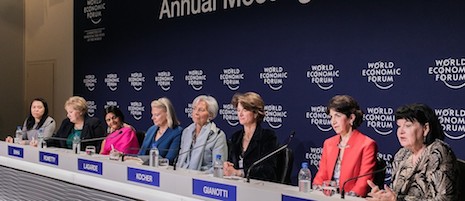- About
- Subscribe Now
- New York,
March 22, 2018

 Carrie Ellen Phillips is cofounder/partner of BPCM
Carrie Ellen Phillips is cofounder/partner of BPCM
There were a few clear themes that continued to bubble up in conversations, lectures and events during my time at the World Economic Forum Jan. 23-26 in Davos, Switzerland.
I have chosen to share these insights rather than things and people who may have already been heavily covered in the news. So here they are.
Everyone agrees on sustainability, but the word is fuzzy. People use the word sustainability all the time but it means something different to everyone.
Some use it to refer to supply chain. Some use it to refer to the environment. Unlike “organic,” there is no governing standard for the word. This leaves the term open for “greenwashing,” similar to the word “natural” on food, which means absolutely nothing.
Brands will need to make these distinctions and define their own brand codes for their customers as the word sustainability gets further co-opted.
One of the most interesting trends was that whether or not the context was sustainability, the topic of sustainable practices came up, even with those companies not currently practicing them.
From a sheer reputation risk point of view, brands and even countries are trying to figure it out or get left behind.
Circularity is the future. William MacDonough from Cradle2Cradle and The Ellen MacArthur Foundation are the two leading voices in this charge and both were making themselves heard at Davos.
At the heart of this argument is improving profitability by using waste products as the world’s new raw materials.
Ellen MacArthur is leading two initiatives, The New Plastics Economy, launched in 2017, and The New Fiber Economy, launched this year. They are incubating technologies that will become the new standard for how to use waste PET and fiber, and are partnering companies with innovative technologies to accelerate development.
The foundation highlighted EVRNU, a technology that turns post-consumer textile waste into renewable fiber, as the most promising, scalable technology for the circular fiber economy.
One of the biggest themes in circularity is creating products in a way that builds them for future disassembly and near-endless usage without degradation of materials or end-of-life pollution.
Technology will save us. Disruptive technology and future innovations were the two buzzwords.
The most progressive view of the human effects of climate change is that it is a problem of bad design, and that good design will be the answer to solving the seemingly unsolvable.
Boyan Slat from The Ocean Cleanup spoke everywhere. Evian announced its partnership with Loop Technologies that turns post-consumer plastic into food-grade PET, and which will take Evian’s plastic bottles from 25 percent post-consumer waste to 100 percent post-consumer waste by 2025.
There was constant talk around how technology needs to change the consumer experience.
Both McKinsey and the Boston Consulting Group are deeply entrenched in the sustainability and future technology space, as well as numerous growth funds and private equity funds popping up, which tells you that there is tremendous opportunity in this space.
 World Economic Forum 2018 in Davos, Switzerland: Seven women co-chairs, 70-plus heads of state, 400-plus sessions and a lot of snow. Image credit: World Economic Forum/Jakob Polacsek
World Economic Forum 2018 in Davos, Switzerland: Seven women co-chairs, 70-plus heads of state, 400-plus sessions and a lot of snow. Image credit: World Economic Forum/Jakob Polacsek
The living wage versus the minimum wage. This is another conversation that has been bubbling up in the fashion industry but was ignited when a group called The Circle produced a paper in 2017 on global supply chains and the living wage.
Most factories pay a minimum wage, but in many countries it is not enough to live on and creates socio-economic conditions where families are forced to live apart and children work instead of go to school, thereby perpetuating poverty.
This conversation came up again and again and fast fashion is in the cross-hairs of the discussion.
Look for this to be particularly contentious in the United Kingdom where NGOs and workers’ rights groups are particularly active.
Reinventing retail. There were no real solutions here, but everyone agrees that they have the same problem. Customers want the convenience of digital technology. They also want personal touch. They want things curated just for them, but they want to be exposed to new things.
Everyone talks about experiential retail, but what was clear is that nobody has figured out what that actually means.
Whereas omnichannel was what every major retailer strived for five years ago, it now seems that this approach creates sterility and disinterest in consumers.
IT IS CLEAR that brands that crack this code with their customers will be the big winners and quickly emulated.
Carrie Ellen Phillips is New York-based cofounder/partner of BPCM, an integrated marketing strategy and communications agency focused on luxury brands. Reach her at carrie@bpcm.com.
Share your thoughts. Click here